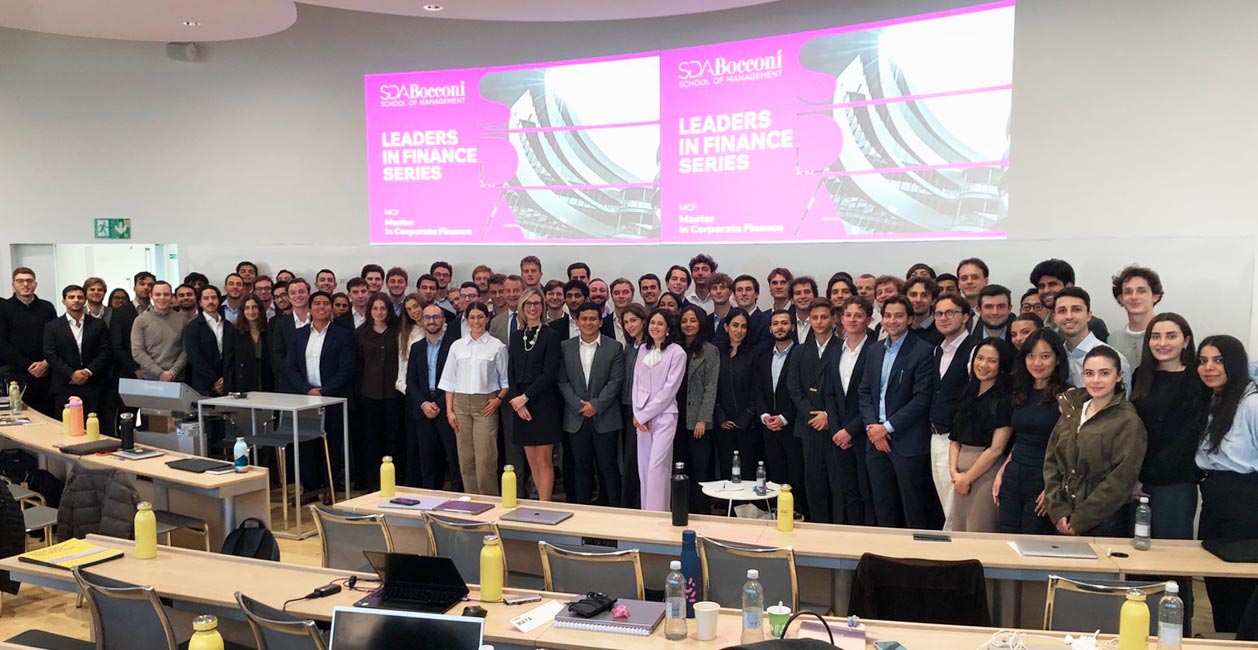On December 4th, 2023, the MCF24 class hosted three distinguished officials from UBS: Ms. Alessandra Calabretta, Director, ETF & Index Fund Sales Italy, Mr. Giorgio Scaglia, Executive Director, Wealth Management Europe, and Mr. Renato Borzone, HR Specialist.
During the session, moderated by Professor Andrea Benocci, the class was happy to learn that Ms. Calabretta is a SDA Bocconi Alumna 2013. Ms. Calabretta brings a wealth of experience in Asset Management that started at Eurizon, Intesa San Paolo’s Asset Management arm, and continues with UBS Asset Management, on the ETF sales team. Her experience with ETFs started in 2013, when there was a massive listing of ETFs on European exchanges.
Ms. Calabretta highlighted the current trends in Asset Management, with reference to a global shift towards passive management strategies that has boosted ETFs’ popularity. She mentioned that the ETF industry in Europe has been seeing steady 12.7% annual growth, going from a value of USD 500 Billion in 2013 to USD 1,515 Billion (2,074 ETFs with 9,645 listings) in September 2023. In contrast, actively managed funds have seen lower growth. ETF investors tend to favor Emerging Market, North America, and Asia Pacific-underlying funds.
In Italy, annual ETF growth has been even higher: from 2015, 17.4% growth rate vs. 13.85% global. A distinctive feature of the Italian market is fixed income ETFs (38.8% of all ETFs).
In explaining why ETFs may be becoming so popular, Ms. Calabretta pointed out that an ETF is a convenient way for an investor to have exposure to a particular market or sector without having to buy each and every individual stock, or to gain exposure to particular asset classes that would otherwise be limited to institutional investors. Potential growth for the retail market is still wide, as ETF issuers compete to digitalize, and offer their own platforms to retail investors. ETFs are resilient to price effects: they do just as well in high-price years, unlike actively managed funds. Also, while it is easy to oversimplify investment strategies as active or passive, there are fewer and fewer instances of pure active or pure passive funds: many new products tend to have ETFs at their core, with managed products as satellites (or ‘side-bets’) to take advantage of market inefficiencies.
ETFs’ growing popularity may also be attributed to their unique features as an asset class: transparency, high liquidity (spreads of a few basis points), ability to closely mirror indices’ performance, cost efficiency, no performance-based fee (unlike active funds), and segregated assets - which keep investors safe, if the ETF issuer faces troubles.
On the other hand, 2023 had been a challenging year for ETF providers, given the boost in interest rates and the loss of investors in fixed income products to high-yield government bonds. Ms. Calabretta stated that brand name alone cannot keep a provider in business. They must have a strategy and provide unique offerings. As one of the world’s leading ETF providers, UBS has done this well, with its expertise in sustainability and currency hedging ETFs.
As a suggestion to those keen on starting their investment journeys, Ms. Calabretta restated Warren Buffett’s famous dictum that ‘the key is Asset Allocation’.
Next, Mr. Renato Borzone presented the various employment opportunities and career paths open to MCF students in UBS, and gave the class valuable advice on the application process.
In the Q&A session, the conversation covered thought-provoking topics, like whether UBS would be likely to enter crypto ETFs, the implications of the UBS-Credit Suisse merger on the Asset Management business, and the need for diversification for beginner investors.
From this deep-dive into the ETF and its portfolio implications, the Master in Corporate Finance class came away with many real-world applications, and a newfound appreciation for an asset class that perhaps has been simplistically understood so far.
SDA Bocconi School of Management






